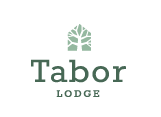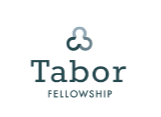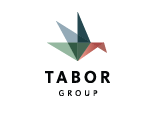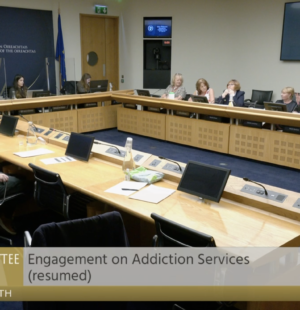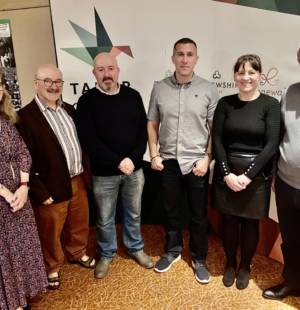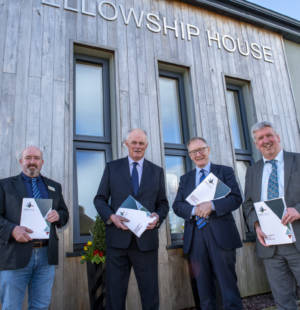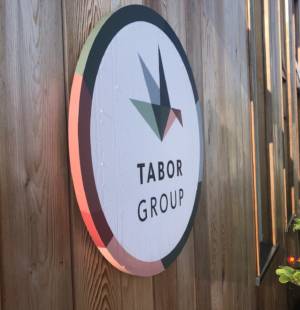Briefing Oireachtas Sub-Committee on Mental Health
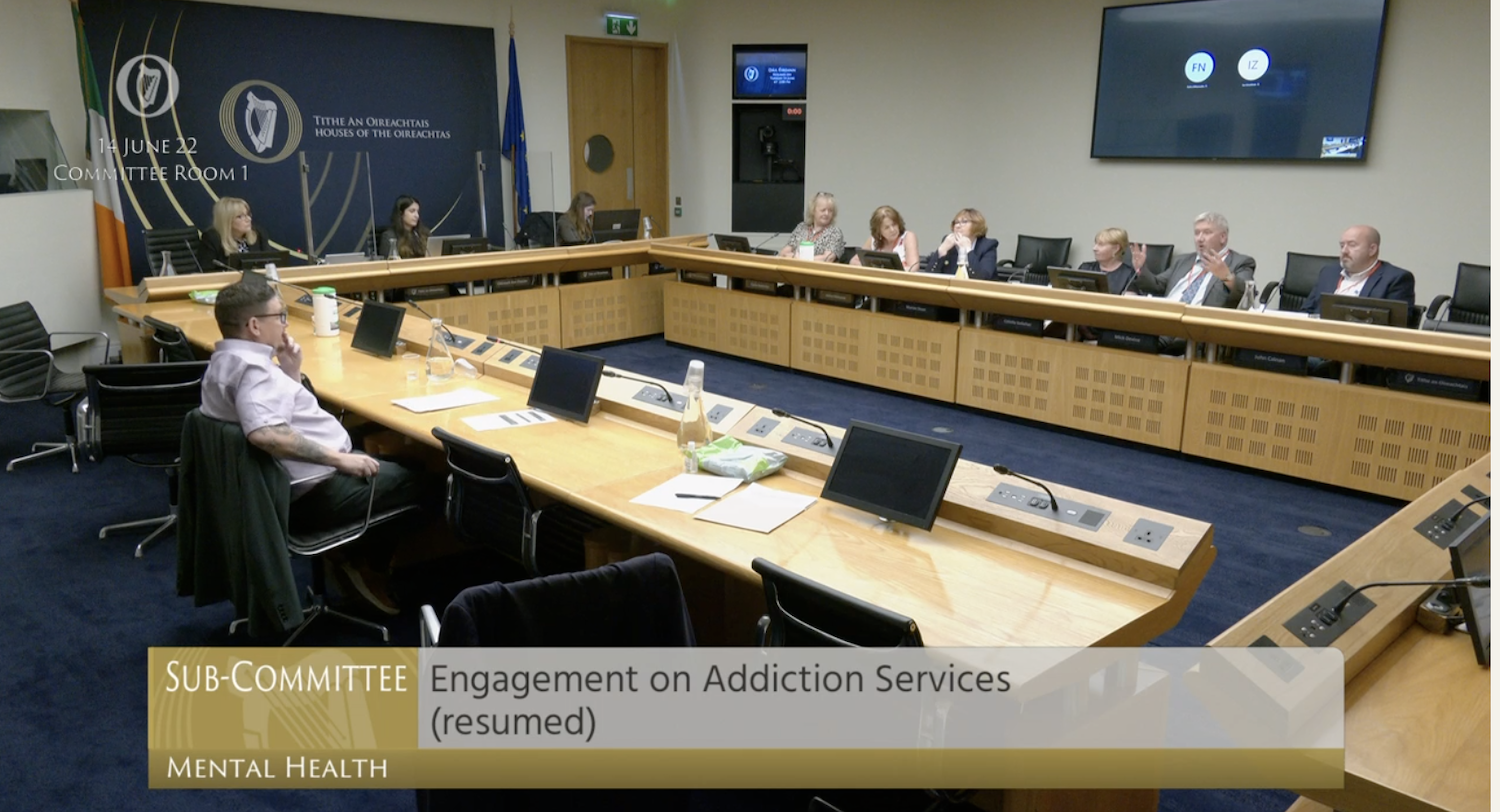
Today, Colette Kelleher, CEO, Mick Devine, Clinical Director and John Calnan, Operations Manager of Tabor Group met with the Oireachtas Sub-Committee on Mental Health chaired by Senator Frances Black to give them an update on Tabor Group’s services.
Opening Statement to Oireachtas Sub-Committee on Mental Health
Thank you for the opportunity to speak today.
Since 1989, every year Tabor Group has been providing support and care to hundreds of people, from all backgrounds and circumstances. We welcome people from all over Ireland. Tabor offers a residential & community-based addiction treatment programmes to men and women over 18 years of age, who are struggling with addiction to alcohol, drugs, and gambling.
We have two residential addiction treatment centres: Tabor Lodge at Belgooly, close to Kinsale, where we offer a Primary Residential Treatment Programme. At our Tabor Fellowship Treatment Centre in Cork City we offer a new programme: Integrated Recovery Treatment Programme, which we will expand on later.
Providing practical support to families and loved ones living with people with addictions is a cornerstone of Tabor’s approach. We provide this through our dedicated Family Support Programme.
Our Continuing Care Programme provides ongoing treatment and support to clients that have completed treatment programmes and are learning to cope with the demands of day-to-day living. Eight Continuing Care groups are running at present.
In addition to this, we also provide a community-based treatment programme, a relatively new initiative at Tabor Group.
The treatment programmes at Tabor Group are client-focused, trauma informed, and adhere to National Protocols for Drug and Alcohol Services. A variety of treatment approaches are delivered including Person-Centered Counselling, 12-Step Fellowship, Motivation Enhancement Therapy, Cognitive Counselling, and Mindfulness-based practices.
The treatment programmes are supported by the Health Service Executive and all major Health Insurers. Tabor Group is accredited by CHKS and has achieved ISO 9001 certification.
In 2021, we received over 1000 calls from people looking for support. We completed more than 300 assessments, with over 200 admissions to our Treatment Centres. On average we get 5 calls a week from family members and loved ones looking for support. In 2021, 16 people attended our community-based programme, 4 of whom went on to attend our primary residential programme.
Alcohol continues to be the main challenge for those seeking help at Tabor Group. In 2021, 49% (103 people) sought help for alcohol related problems at Tabor Group. But we are seeing continued growth in those presenting with poly-addiction. Last year, 32% of those who accessed treatment at Tabor Group had issues with both alcohol and other substances. Many will also have mental health challenges too.
Tabor Group has shown great resilience over the past two years. With commitment and resolve we continued to serve our clients. We did more than just weather the storm.
As for others Covid-19 presented significant challenges for the organisation. Thanks to Tabor’s staff, volunteers and funders including HSE, Pobal, Probation Service, Cork City Council and others we rose to them. Working together, and with support from Mercy Hospital, we were able to keep our addiction treatment services open and Covid-19 free.
Over the years Tabor has continued to evolve and develop our services to meet the changing needs of people.
Following extensive research, planning, and preparation and under the leadership of Con Cremin, in 2021 we introduced and completed our first full year of our Integrated Recovery Programme at Tabor Fellowship, which I mentioned earlier. A milestone for Tabor Group. This 12-week programme is open to both women and men with complex needs including poly/cross-addiction, or a history of previous treatment and relapse, as well as challenges with coping and living skills. A younger profile of people is accessing this programme.
Tabor developed a new treatment manual which outlines the service delivery of each of our programmes, and we introduced new polices.
We forged partnerships with University College Cork (UCC) and UCC Adult Continuing Education (ACE) in delivering a ‘Certificate in Continuing Professional Development in Responding to Problem Gambling’.
We also partnered with UCC’s Department of Applied Psychology, Department of Public Health and Epidemiology and Department of Adult Continuing Education as well as Munster Technological University’s Department of Social Sciences to provide teaching inputs on their programmes and joint research projects. We are in the process of developing a Tabor Group Research Agenda in partnership with these institutions and other institutions.
Tabor Group is embedded in the local community in Cork and the HSE CHO 4 area. We enjoy excellent working relations with HSE Drug and Alcohol Service under the leadership of David Lane. An annual Section 39 Service Level Agreement has been in place for several years. Tabor Group is an active member of the Local and Regional Drugs Task Forces. We work closely in partnership with community-based hubs who refer clients to our services. We work together with other agencies for effective case management, so that people don’t ‘fall through the cracks’, particularly when people complete their treatment.
Nationally, Tabor Group is committed to playing its part in achieving the strategic priorities of the national drug and alcohol strategy Reducing Harm, Supporting Recovery. We contribute to “enhancing access to services”, “developing integrated care pathways”, “responding to the needs of disadvantaged communities and those with drug related offences”. We are also committed to “evidence-informed and outcome-focused practice”.
Tabor Group seeks to be at the forefront in the development of effective drug and alcohol services to meet the emerging and complex needs of clients and their families.
Central to this is the development of evidence-based, trauma-informed addiction treatment addressing the complex needs of those struggling with addiction in a safe residential and community environment, through programmes delivered by trained and registered counsellors and psychotherapists.
Tabor Group seeks to be a learning community where research and training for the next generation of practitioners in the field of drug and alcohol services goes hand-in-hand with offering excellent and effective treatment support for the growing number of people, and families seeking help.
Thank you for your time. We look forward to hearing from the members of the Committee and to responding to your questions.
Recent Posts
- How to Help a Loved One Struggling with Addiction
- Tabor Group Calls for Urgent Funding to Address Growing Addiction Crisis
- Forgiveness in Recovery
- National Drugs Strategy launches interactive map to facilitate access to 442 publicly-funded drug treatment
- Statement from Colette Kelleher, CEO Tabor Group
Categories
Archives
- September 2024
- July 2024
- June 2024
- January 2024
- December 2023
- August 2023
- July 2023
- May 2023
- April 2023
- March 2023
- January 2023
- October 2022
- September 2022
- August 2022
- July 2022
- June 2022
- May 2022
- April 2022
- March 2022
- February 2022
- January 2022
- December 2021
- November 2021
- October 2021
- September 2021
- August 2021
- July 2021
- June 2021
- May 2021
- April 2021
- March 2021
- February 2021
- January 2021
- December 2020
- November 2020
- October 2020
- September 2020
- August 2020
- July 2020
- June 2020
- May 2020
- April 2020
- March 2020
- February 2020
- January 2020
- December 2019
- November 2019
- October 2019
- September 2019
- August 2019
- July 2019
- June 2019
- May 2019
- April 2019
- March 2019
- February 2019
- January 2019
- December 2018
- November 2018
- October 2018
- September 2018
- August 2018
- July 2018
- June 2018
- May 2018
- April 2018
- March 2018
- February 2018
- January 2018
- December 2017
- November 2017
- October 2017
- September 2017
- August 2017
- July 2017
- June 2017
- May 2017
- April 2017
- March 2017
- February 2017
- January 2017
- December 2016
- November 2016
- October 2016
- September 2016
- August 2016
- July 2016
- April 2016
- March 2016
- December 2015
- March 2015
